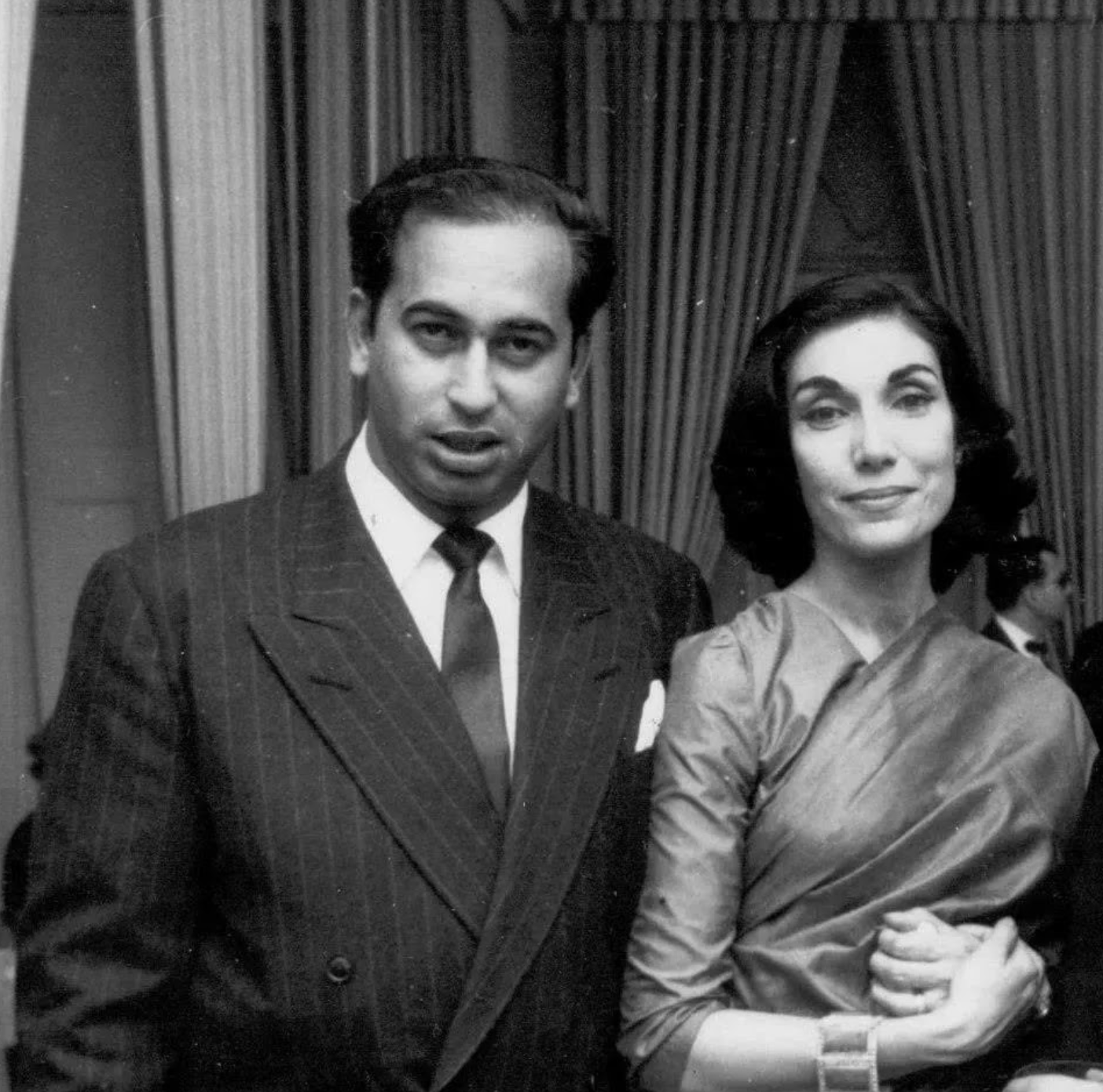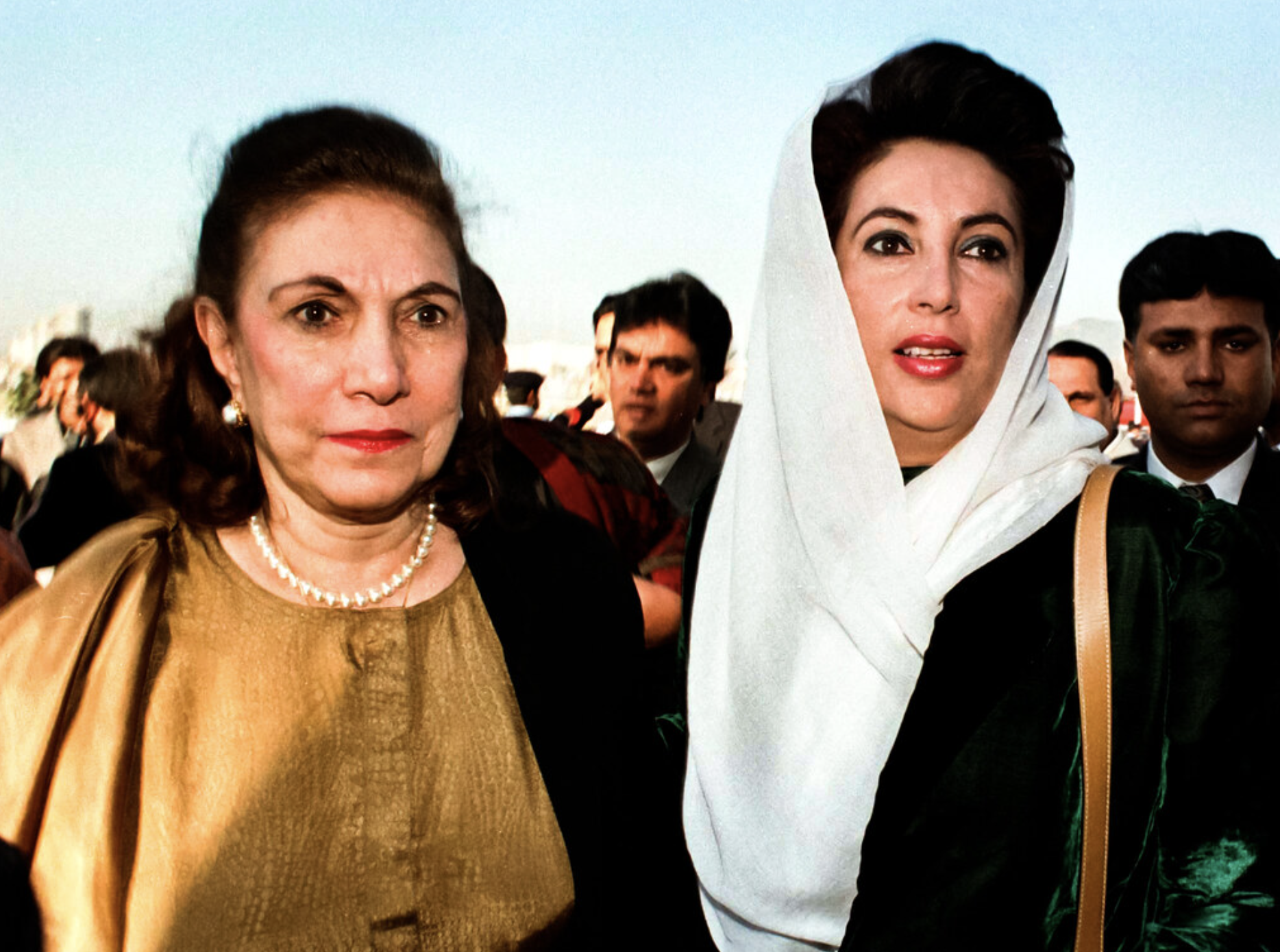Nusrat Bhutto was the First Lady of Pakistan from 1973 to 1977, during the rule of her husband, Prime Minister Zulfikar Ali Bhutto. She succeeded him as head of the Pakistan People’s Party (PPP) from 1979 to 1983. She was also the mother of Pakistani Prime Minister Benazir Bhutto, who was assassinated in 2007.
Nusrat was born on September 21, 1929, to the wealthy Kurdish Isfahani Hariri family, who resided in the city of Isfahan in Iran. Her father, a businessman, settled in Karachi, Pakistan, and the family had built a wide network of businessmen throughout the subcontinent before the partition of India in 1947.
Her mother, Fatima Al-Mahouzi, was nine years old when she married Nusrat’s father, Mirza Al-Sabounji. Her father was educated and an avid traveler. He went to India for tourism and found that the soap industry there was flourishing and generating huge profits. He later returned to Iran and asked his wife to accompany him, which she reluctantly did.
Nusrat loved studying and science, so she went to Pakistan to study engineering. There, she met and fell in love with Zulfikar Ali Bhutto, before he was a famous leader in Pakistan. He asked for her hand in marriage, but her father refused to let her marry a Pakistani. There is a story that claims that Bhutto imagined Nusrat in the palace of Mohammad Reza Shah Pahlavi in Tehran when he met her, as he was so impressed by her elegance, and proposed to her immediately.
After the death of her father, Nusrat insisted on marrying Ali Bhutto. The wedding, held on September 8, 1958, in the presence of her family, was grand and royal, and the marriage was a happy one. Nusrat lived in a spacious and luxurious palace, with mirrors plated with gold and precious stones. It was a dream come true, and she had two daughters, Benazir and Sanam, and two sons, Shah Nawaz and Murtaza. The sons resembled their father in wisdom and leadership, but they differed with each other politically and both met tragic ends. Shah Nawaz died of poisoning in France in 1985, and Murtaza was killed during clashes with the Pakistani police under mysterious circumstances in 1996.
After the execution of her husband – then the prime minister of Pakistan – in 1979, she chaired the PPP until 1986, with her daughter Benazir assisting her. A member of the Socialist International, the party had its headquarters in Islamabad, and its stronghold was in the Sindh province in the southern part of the country, as well as the Punjab province in the east. Later, Nusrat was elected as a member of the Pakistani parliament for two terms. In the 1980s, Nusrat left Pakistan for the UAE, as she was suffering from Alzheimer’s disease.

The tragedies of politics
In many ways, Nusrat’s tragic story is not very different from the story of the Kurdish people. She faced severe shocks and traumas through which she persevered, starting with the execution of her husband Zulfikar, the assassination of her two sons, and then her daughter Benazir in 2007.
Her family was characterized by stubbornness, defiance, and insistence on achieving their objectives, even if the price was their lives. In this way, we can describe Nusrat as the “Khansa” of sad Pakistan. Both her husband and her three children paid a heavy price for leading the wave of tumultuous politics in a country known for political unrest and its complex social and economic conditions.
On March 22, 2010, Asif Ali Zardari, then-co-chairman of the PPP, the former President of Pakistan, and Benazir’s widower, stated that: “Begum Nusrat Bhutto was a great woman, a national treasure, not only because she was the woman behind two of our country’s greatest leaders, Zulfikar Ali Bhutto and Benazir Bhutto.”
Nusrat died in Dubai, on Sunday, October 23, 2011. Her body was taken to the town of Garhi Khuda Bakhsh in the southern province of Sindh. Thousands of mourners led by Zardari and senior state officials laid flowers on the grave of the Bhutto family after prayers in Pakistan’s largest mosque. She was buried next to her husband Zulfikar in the family cemetery.

Benazir Bhutto
Nusrat’s daughter Benazir became interested in politics at a young age, which paved the way for her future career. She went on to become the first – and youngest-ever – woman to hold a position of leadership in a Muslim-majority country and was one of the most famous political leaders in modern times. Born in Karachi on June 21, 1953, Benazir married Zardari in 1987 right before the general elections. He later became the 11th President of Pakistan and the head of the PPP after Benazir was assassinated in December 2007.
Benazir was influenced by her father Zulfikar’s ideology and Western lifestyle throughout her life and especially in her education. She was considered an advocate of democracy and human rights. After completing her studies at Harvard University in the United States and Oxford University in the UK, she returned to Pakistan in 1977, shortly before the coup against her father led by Muhammad Zia-ul-Haq, which ended with his execution in 1979. She remained under house arrest before leaving Pakistan to spend ten years in exile.
Benazir returned to Pakistan after Zia-ul-Haq was killed in a plane crash in 1988 and assumed leadership of the PPP, a party founded by her father. Her coalition won a slight majority in the general elections, making her the first woman in a Muslim country to hold the position of Prime Minister on December 1, 1988. Her government faced many economic problems, which led to political opponents accusing her and her husband – then the Minister of Foreign Affairs – of corruption and abuse of power. Her government fell in August 1990, and her husband was sentenced to three years in prison from 1990 to 1993.
Three years later, Benazir was able to return to the prime minister’s office after winning the October 1993 elections. However, her government was overthrown for the second time in 1996 after renewed accusations of bribery and corruption against her husband. She then lived in exile, moving between the UK and the UAE, and was banned from entering the country because she did not appear for a court appearance in 2002.
A pardon was later issued by President Pervez Musharraf, which enabled her to return to Pakistan. On October 18, 2007, she returned to Karachi to lead the PPP in the general elections, carrying the banner of returning the country to the civilian rule. On the very day of her return, she survived an assassination attempt.
Two months later, on December 27, 2007, she was once again targeted during a procession after leaving an election conference for her supporters. She was killed by a bullet to the neck and another to the chest.
Besides her political career, Benazir is known for her 1989 book Daughter of Destiny. She also won the Bruno Kreisky Prize for Human Rights in 1988.
Benazir was influenced by her mother Nusrat and considered herself Kurdish, as she revealed during a press conference when she attended the Socialist International Conference in Rome on July 21, 2003. “I consider myself Kurdish because my mother is of Kurdish origin, and my mother played a major role in my father becoming the prime minister of Pakistan. I naturally became very interested in the problems of the Kurdish people, and their problems will not be solved except through democracy and peace.”
Muhammad Ali Al-Suwirki Al-Kurdi a Jordanian national of Kurdish descent, is a distinguished individual with a PhD in Philosophy/Education and Curricula. He is an esteemed member of the Jordanian Writers and Writers Union and has been recognized for his contributions to the modern history of Jordan, receiving the State Encouragement Award.